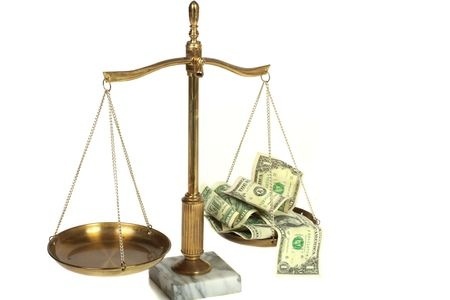News Articles
Tuesday, December 26, 2017
Claimants' Attorney Fees Jump 36%
- State: Florida
- Topic: Top
- - Popular with: Legal
- - 2 shares
Florida business leaders are saying “told you so” after the Office of Judges of Compensation Claims reported that claimants’ attorney fees increased 36% in the latest fiscal year.
 After decreasing for 11 straight years, there was a slight bump in claimants' attorney fees during the fiscal year ending in June 2016. But the $185,676,766 paid between July 2016 and June is the most since the $188,701,256 paid during the fiscal year ending in 2008.
After decreasing for 11 straight years, there was a slight bump in claimants' attorney fees during the fiscal year ending in June 2016. But the $185,676,766 paid between July 2016 and June is the most since the $188,701,256 paid during the fiscal year ending in 2008.
David Langham, deputy chief judge of the OJCC, said all signs point to increased litigation following the state Supreme Court’s April 2016 decision in Castellanos v. Next Door Co., which reinstated hourly fees for claimants’ attorneys.
The OJCC report, noted in Langham’s blog, also said defense attorney fees accounted for nearly 58% of $439,609,031 in total legal fees paid during fiscal year 2017.
The OJCC is required by law to approve all attorney fees paid by, or on behalf of, an injured worker. There is no such requirement for the approval of fees paid by employers and carriers for their defense counsel representation, however.
The OJCC simply requires carriers to report their total annual expenditures for aggregate defense fees.
In response to fears that claimants’ attorney fees would rise after Castellanos, those lawyers have responded that carriers have to pay fees only when they wrongly deny legitimate claims.
Business groups have been warning of skyrocketing claimants’ attorney fees since the Castellanos ruling and have urged lawmakers to enact reforms.
House Bill 7009, which was prefiled last month by Rep. Danny Burgess, R-Zephyrhills and chairman of the House Insurance & Banking Subcommittee, would cap claimants’ attorney fees at $150 an hour.
The bill is similar to Proposed Committee Bill 18-01, which passed the House Commerce Committee by an 18-8 vote, largely on party lines, Nov. 14.
The proposed legislation would allow hourly or so-called “departure” fees outside of the statutory fee schedule if the total payment would amount to less than 40%, or greater than 125%, of the customary amount a defense attorney would have earned in the same locality.
“We are not surprised by the judge’s assessment of workers’ compensation attorney fees being on the rise due to an increase in litigation,” said Tom Feeney, president and chief executive officer of Associated Industries of Florida.
“AIF warned from the beginning that this would happen and will continue to happen if proper reform measures are not put in place to address Florida’s ailing workers’ compensation system,” Feeney said. “This is just the first swell from the storm that is expected to hit Florida businesses like a Category 5 hurricane.”
The Florida Chamber of Commerce also is pushing for what it calls “meaningful” workers’ compensation reforms to address the claimants’ attorney fee issue.
Last week, the chamber sent out a report published by the American Tort Reform Foundation, which recently named Florida for the first time in its 15-year history of rankings as the nation’s worst “Judicial Hellhole.” ATRF, which ranked California No. 2, cited the “aggressive personal injury bar’s fraudulent and abusive practices in South Florida and elsewhere.”
ATRF said it has documented the shady referral relationship between some Florida personal injury attorneys and the medical clinics to which they refer their clients. That system, ATRF says, leads to inflated medical bills, settlements and court judgments.
The Judicial Hellholes report does not mention any rulings on workers’ compensation lawsuits.
“Unfortunately, this increased litigation isn’t for the sake of getting greater benefits for injured workers, but is really about plaintiff attorneys trying to make more money,” said Carolyn Johnson, the chamber’s director of business, economic development and innovation policy. “The system should be for the benefit of the injured workers, not for trial attorneys trying to hit payday.”
The high court’s 5-2 decision in Castellanos v. Next Door Co. declared the state’s statutory fee schedule unconstitutional because it did not allow for reasonable fees in some cases, such as those that are complex and labor-intensive.
The state’s statutory fee formula calls for claimants’ attorneys to receive 20% of the first $5,000 in benefits secured, 15% of the next $5,000, 10% of the remaining amount of benefits secured during the first 10 years after a claim is filed, and 5% of the benefits secured after 10 years.
Claimants’ attorneys say their fees spiked because many hoarded fee claims in hopes of a favorable ruling in the Castellanos case nearly two years ago.
“There’s really nothing shocking in the OJCC data,” said Maitland claimants’ attorney Geoff Bichler. “It’s completely predictable that we’d have that kind of a jump. There was a glut in the initial processing of these fee entitlements. When that happens, there’s going to be a natural spike."
“I expect it will probably level out because there aren’t as many fee entitlements in the pipeline,” Bichler said. “You’re also going to see carriers responding to their fee exposure if they deny claims wrongly. Carriers, by way of claims management processing, will begin to minimize their exposure to claimants’ attorney fees.”
He noted that in 2015-16, defense fees made up 64% of all attorney fees and that carriers are allowed to include claimants’ attorney fees in their rate base.
According to OJCC data, the fees were split almost evenly between claimants’ and defense attorneys in fiscal year 2003, before beginning a steady climb that reached 63.85% in favor of defense counsel spending last year.
“Those should be excluded,” Bichler said. “Why should insurance carriers be able to pass that on to employers in higher premium costs when they wrongfully deny claims? That’s a poor risk management model.”
Langham said in his blog that the “notable increase” in claimants’ attorney fees were mostly attributable to hourly fees for litigation of issues. The aggregate of hourly attorney fees were $25,866,295 in fiscal 2016 and jumped nearly $50 million in fiscal 2017 to more than $75 million.
West Palm Beach defense attorney H. George Kagan agreed that the spike in opposing counsels’ fees were due to a backlog of fee petitions.
“And of course, when their activity goes up, ours goes up,” he said.
The OJCC’s latest annual report is here.
Today’s News
- Calif. - Chiropractor Sentenced to More Than 54 Years, Fined $23M Top 04/16/24
- Colo. - Worker Gets Benefits for Head Injury WEST 04/16/24
- La. - Worker's Claim for COVID-19 Infection Dismissed as Untimely SOUTH 04/16/24
- Ohio - Worker With History of Injuries Gets PTD Benefits NORTH 04/16/24
- N.Y. - Court Upholds Dismissal of Claims for Construction Accident NORTH 04/16/24
- Fla. - State Joins Texas in Prohibiting Local Workplace Safety Rules SOUTH 04/16/24
- Ntl. - OSHA Sets Training Event NATIONAL 04/16/24
Advertisements
Now Trending
- Workers' Compensation News
-
Calif. WCAB
Proposes $40k in Sanctions, Alleges
Pattern of Misusing Recon to Delay…
Posted on Apr 11, 2024
-
Calif. Committee
Passes TD Expansion, Ag Worker
Protection…
Posted on Apr 12, 2024
-
Calif. Senate
Committee Hears Comp Bills…
Posted on Apr 10, 2024
-
Calif. Worker
Waits Too Long to Sue Over Alleged
Chemical Exposure…
Posted on Apr 12, 2024
-
Calif. Contractor
Pleads Guilty to Underreporting…
Posted on Apr 15, 2024
-
Ill. Traveling
Employee Gets Award for Injuries
From Fall Down Stairs at…
Posted on Apr 10, 2024
-
Ill. Worker Who
Repeatedly Failed to Appear at
Hearings Can't Get Claim…
Posted on Apr 15, 2024
-
Ohio Worker Gets
Writ for Reconsideration of Job
Offer…
Posted on Apr 9, 2024
-
S.C. Supreme Court
Expresses 'Profound Concern' With
Administrative Denial of…
Posted on Apr 12, 2024
-
N.Y. Business
Owner Accused of $236,515 Premium
Fraud…
Posted on Apr 10, 2024
Jobs
Upcoming Events
May 5-8, 2024
Risk World
Amplify Your Impact There’s no limit to what you can achieve when you join the global risk managem …
May 13-15, 2024
NCCI's Annual Insights Symposi
Join us May 13–15, 2024, for NCCI's Annual Insights Symposium (AIS) 2024, the industry’s premier e …
May 13-14, 2024
CSIA Announces the 2024 Annual
The Board of Managers is excited to announce that the CSIA 2024 Annual Meeting and Educational Con …
Social Media Links
c/o Business Insurance Holdings, Inc.
Greenwich, CT 06836






No Comments
Log in to post a comment